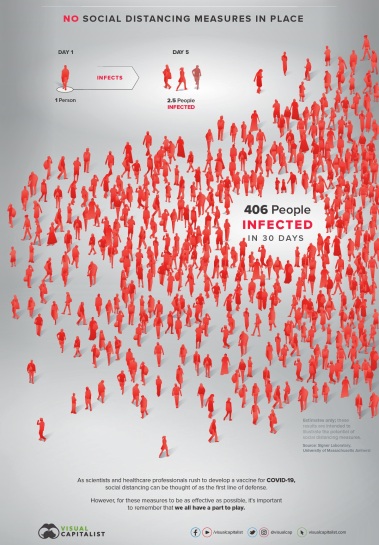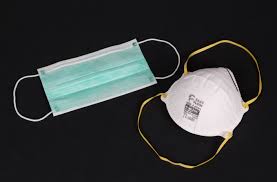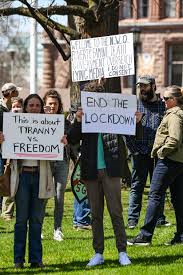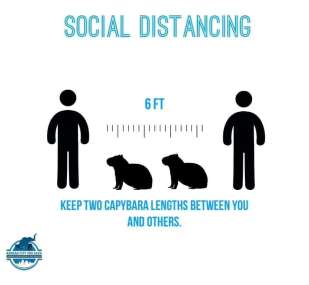Disclaimer: I am not an infectious disease expert. If any infectious disease experts have new information, especially if I’m hella wrong, LET ME KNOW so I can put it in here! Also, this post is labeled as an opinion piece, as a heads up.
I don’t know if you know this or not, but there is a BIG BAD outside right now, and sometimes inside, and maybe on our mail or produce. The details are still kinda fuzzy as researchers and health professionals patchwork together more and more information about what this BIG BAD does and how to protect ourselves and others from it.
 The BIG BAD, of course, is COVID-19, also known as Coronavirus, SARS-CoV-2, and (what my friends and I jokingly call it to make it sound less bad so that we don’t have panic attacks) The ‘Rona. But Mari, you ask, What is all this about putting others before our own personal liberties? Good question, my good reader! Today I want to try to convince you that we should be social distancing and wearing masks. And we should be doing this not for ourselves (which is tied to personal liberties) but for other people.
The BIG BAD, of course, is COVID-19, also known as Coronavirus, SARS-CoV-2, and (what my friends and I jokingly call it to make it sound less bad so that we don’t have panic attacks) The ‘Rona. But Mari, you ask, What is all this about putting others before our own personal liberties? Good question, my good reader! Today I want to try to convince you that we should be social distancing and wearing masks. And we should be doing this not for ourselves (which is tied to personal liberties) but for other people.
Please don’t click out of this page just yet. I know it’s really controversial right now among different circles, but give me a chance, yeah?
Thanks.
Why DON’T people want to social distance and wear masks?
Before we go any further, we should talk about why people are against participating in these public health measures. We gotta make connections and understand each other before we can have any real conversations, right? The big reasons I’m going to outline are just from personal experience (either my own feelings/thoughts or those of friends and acquaintances on the internets), so this is in no way a comprehensive list.
Social Distancing
 Social distancing is the practice of physically distancing yourself from other people. The guidelines have changed quite a lot, from “no more than 10 people in a room” to “at least 6 feet apart” and now we are learning that it’s maybe more like 10 feet apart and also if you’re running or biking you should NOT be behind other people by 15-20 feet because you’ll run/bike through their germs.
Social distancing is the practice of physically distancing yourself from other people. The guidelines have changed quite a lot, from “no more than 10 people in a room” to “at least 6 feet apart” and now we are learning that it’s maybe more like 10 feet apart and also if you’re running or biking you should NOT be behind other people by 15-20 feet because you’ll run/bike through their germs.
This brings me to our first reason people aren’t super into it: because the rules keep changing, which means that not only are people unable to keep up, but constant change makes it feel, to many, that the experts don’t actually know what they’re talking about. As a scientist I feel that I should say that the reason it’s changing is because we are learning more and more, such that newer information is better information, but I totally get how the constantly changing guidelines would lead to uncertainty.
Another, more personal reason (in that I have personally felt this but also I know people who are feeling this even more) is the loneliness that comes with not seeing your family and friends for months on end and feeling trapped in your home. Y’all, it’s just really hard. I’m an extrovert and all my friends are moving away after finishing their dissertations (some have already left) and I don’t get to say goodbye and hug them before they leave. I have a few friends who have had the social isolation lead to worsening their depression/anxiety symptoms. Being alone is REALLY HARD and hanging out online is just not the same. This is even harder if you have kids. How do you tell them that they can’t play with friends or see grandma (not to mention being stuck with them all day every day if you’re not used to it).
So the rules are confusing and it’s bad for our mental health. Those reasons make a lot of sense, right?
Masks

The rules on masks are similarly confusing. Some places are requiring them, others are saying they’re not necessary. Which type of masks work? Who do they work for? Do they mean I can be closer than 6ft to people? Same as with social distancing, no one really knows whether they work or under which circumstances they work.
Also? Masks are hella uncomfortable. You can’t touch them and you can’t eat/drink in them and you just breath in your own breath and realize you should have taken a mint earlier (but now it’s too late) and suddenly your nose itches.
They’re also very difficult to get right now. The N-95 masks which are the best masks for this sort of thing are sold out to the point that hospitals can’t get them. So you keep hearing about not buying those. But those are the only ones that do anything to protect you. But you can’t get them anyway. So people are using other paper masks or sewn fabric masks. Which don’t protect the wearer much (but, as we will discuss a bit later, protects those around you more).
So, again, confusing rules, plus physical discomfort and difficulty in obtaining good-enough protection. Checks out.
Personal Liberties
Let’s go into the personal liberties aspect of all of this. The gist of it is that people are  saying they do not need to wear masks or socially distance because it is their body and therefore their choice whether they put themselves at risk to get this virus. The idea is that if they don’t wear a mask or socially distance themselves, they are taking their own risk and if others want to wear a mask or stay home then they totally can.
saying they do not need to wear masks or socially distance because it is their body and therefore their choice whether they put themselves at risk to get this virus. The idea is that if they don’t wear a mask or socially distance themselves, they are taking their own risk and if others want to wear a mask or stay home then they totally can.
There is also a lot of discomfort in the “forced” aspect of social distancing and wearing masks, where people worry that the government will take away more and more liberties until we live in an Orwellian dystopia. That one is…outside the scope of this blog post.
Why should you still do these things?
So here’s where I try to convince you (if you’re not sure about these things) that it’s still worth it to take these precautions. Again, not for yourself, but for those around you. And in turn those around you should be doing these things for you.
Before that, though, I want to remind you that I am not personally an infectious disease expert. I study public health policy on tobacco, which is very different. I have been reading things written by infectious disease experts and have a few friends in this field who I am constantly asking questions of, but if they tell you something else here, do that. And I’ll also edit this for that purpose because I believe in updating information based on new knowledge.
Okay. Here we go.
Let’s start with the underlying assumption that through going out and not wearing masks, you are only putting yourself at risk. This would make sense, if the disease were less contagious and if only people showing symptoms were contagious.

The problem is that this is a very contagious disease, that you can get by breathing in someone’s breath, or touching your face after touching a surface that someone else sneezed on (or they sneezed on their hand and put it on the surface, even). So it’s super easy to transmit. But the scariest part is that it is super easy to transmit even without the symptoms.
Hypothetical story time: If I do not have any symptoms or have very light symptoms but have COVID, and I go on a run and someone is running behind me and they breathe in enough of my COVID-y particles, then they might get COVID and they may not be as lucky as I am with my no-symptoms. If we had been farther apart, they may not have been exposed.

Hypothetical story time 2: Electric Boogaloo: If I do not have symptoms or have very light symptoms but have COVID, and I go to the grocery store and I see a friend there and we chat in the aisle (let’s say I’m not wearing a mask but they are). Their mask doesn’t give them much protection against me because I don’t have a mask on (again, one of the reasons people aren’t super into the idea of wearing masks), meaning they might catch my COVID and who knows if they’ll have worse symptoms. If we both wore masks, then the chances of contagion decrease.
So I talk about chances a lot. That’s because there is not going to be a PERFECT way to not get this unless you hide away until it’s eradicated and have a year’s worth of groceries already stockpiled or something. But any way to lower to chances that someone gets sick should be worth it, right? This means that using these measures is less about us and more about the people around us. This is a test in empathy, and in taking responsibility for the health of others.
In conclusion
Please do the things that infectious disease experts are telling us to do because they protect us and the people around us to some degree, and some degree is better than no degree if it means saving lives.
I know this one wasn’t nearly as science-y as usual. I’m honestly also being affected by this whole thing (my motivation/focus has plummeted) and I’m in the middle of my dissertation writing. I promise more science will come.
Here’s my dog, who is very happy that I am working from home.
